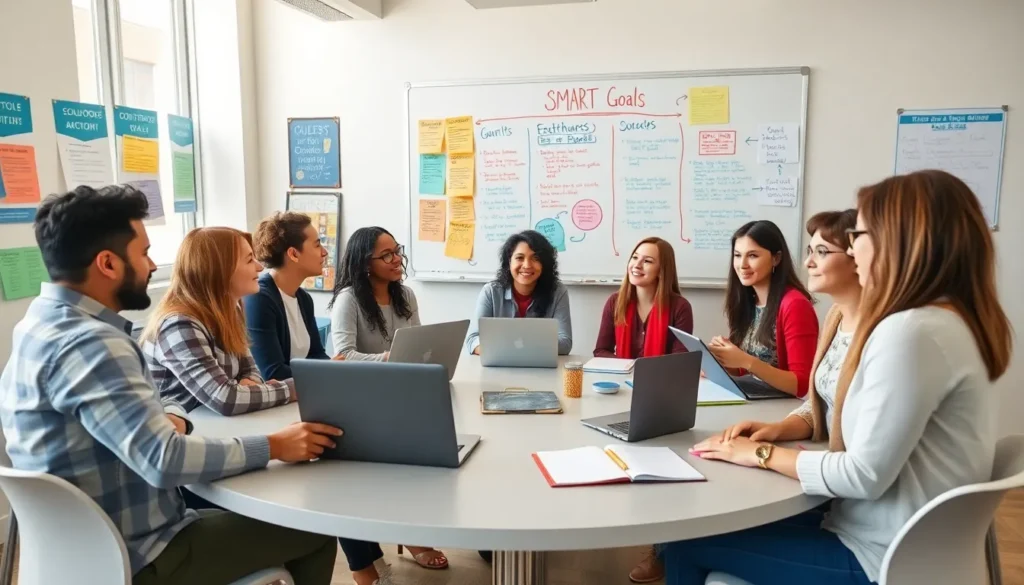In a world bursting with flavors, colors, and stories, the Day of Respect for Cultural Diversity is like a global potluck where everyone brings their best dish. It’s a chance to celebrate the rich tapestry of cultures that make up our communities, reminding us that differences aren’t just okay—they’re downright delicious!
Table of Contents
ToggleOverview Of The Day Of Respect For Cultural Diversity
The Day of Respect for Cultural Diversity celebrates the rich variety of cultural expressions worldwide. Established in 2001 by the United Nations, this day encourages communities to recognize and appreciate cultural differences. The observance takes place on April 15 each year, offering a platform for educational initiatives, discussions, and cultural events.
Highlighting cultural diversity promotes tolerance and understanding among various groups. It emphasizes that different traditions, languages, and practices enrich societies. Activities often include workshops, performances, and art exhibits that showcase the unique aspects of various cultures. Educational institutions frequently participate by organizing special programs that inform students about different cultural backgrounds.
Communities around the world engage in meaningful dialogue, fostering connections among individuals of diverse heritages. This day encourages participation from all age groups, ensuring everyone values cultural uniqueness. Events usually occur in public spaces, drawing attention to the importance of diversity in creating a harmonious society.
Countries like Canada, Australia, and many others actively promote the Day of Respect for Cultural Diversity through government support and local initiatives. Embracing various traditions not only strengthens cultural bonds but also leads to a more cohesive community. By celebrating this day, societies collectively turn a spotlight on the significance of inclusion and respect, paving the way for a more equitable future.
History And Significance
The Day of Respect for Cultural Diversity highlights the rich diversity present in global societies. It serves as a reminder of the value cultural differences bring to communities.
Origins Of The Celebration
The celebration began in 2001, established by the United Nations. It aimed to promote understanding and respect among various cultures worldwide. This initiative emerged from a broader effort to address challenges posed by globalization. Recognizing that cultural dialogue strengthens societies, the day encourages various activities that enhance awareness. Participating countries emphasize the importance of showcasing their unique cultural heritage during events.
Key Milestones
Several milestones mark the development of the Day of Respect for Cultural Diversity. In 2002, the observance expanded internationally, encouraging more nations to participate. Educational programs emerged in various schools to teach students about different cultural backgrounds. By 2010, numerous cultural organizations started collaborating to enhance the day’s significance. Global events, including workshops and exhibitions, began attracting wider audiences. In recent years, online platforms further disseminated knowledge about cultural diversity, allowing global participation.
Activities And Events
Activities and events on the Day of Respect for Cultural Diversity offer diverse opportunities for engagement and learning. Communities make a collective effort to celebrate through various initiatives.
Community Celebrations
Community celebrations often involve festivals that showcase different cultures. Food stalls featuring traditional dishes attract visitors and encourage cultural exchange. Performances highlight music and dance from various heritages, engaging audiences and promoting appreciation. Art exhibits display works that reflect cultural themes, bringing local artists into the spotlight. Dialogue sessions allow community members to share personal stories and experiences related to their cultural backgrounds. Participation from local businesses reinforces the sense of unity, creating a vibrant and inclusive atmosphere.
Educational Programs
Educational programs proposed for this day focus on teaching students about cultural diversity. Schools organize workshops to facilitate discussions about heritage, traditions, and social issues. Curriculum enhancements include lessons on world history and global citizenship, fostering understanding at an early age. Interactive activities, such as storytelling sessions, immerse students in different cultural narratives. Collaborative projects with cultural organizations provide students hands-on experience, deepening their connection to diverse communities. Engaging resources, like documentaries and literature, enhance classroom learning, contributing to a well-rounded educational experience.
Impact On Society
The Day of Respect for Cultural Diversity significantly impacts society, fostering essential values like tolerance and inclusivity. Observance enhances collective awareness about the rich tapestry of cultures present in communities.
Promoting Tolerance And Understanding
Promoting tolerance and understanding starts with educational initiatives that illustrate the benefits of cultural diversity. Discussions and workshops provide platforms for individuals to share experiences and perspectives. Celebrating different customs encourages empathy and minimizes prejudice within communities. Countries observe this day through various programs, ensuring that participants comprehend the significance of each culture’s contributions. Increased awareness leads to stronger interpersonal connections, resulting in more harmonious environments. Schools frequently integrate cultural diversity into their curricula, helping students appreciate differences from a young age. When communities embrace diversity, they cultivate spaces where acceptance thrives.
Encouraging Inclusivity
Inclusivity emerges as a vital focus for communities celebrating the Day of Respect for Cultural Diversity. Engagement in cultural events allows everyone to participate and learn from one another’s customs. Festivals, performances, and interactive sessions offer opportunities for people to connect across cultural boundaries. Representation of various cultural groups fosters dialogue and opportunities for collaboration. Organizations often partner with local communities to ensure that events reach diverse demographics. Workshops designed for all ages make learning about different backgrounds accessible and enjoyable. By emphasizing inclusivity, societies build stronger relationships and encourage collaborative problem-solving, enhancing social cohesion.
Future Directions
Expanding the observance of the Day of Respect for Cultural Diversity involves a strategic focus on education. Educational institutions play a vital role by integrating cultural diversity into their curricula. Schools could promote cultural understanding through partnerships with local communities and cultural organizations.
Developing innovative programs that encourage participation can enhance the day’s impact. Workshops featuring guest speakers from diverse backgrounds help students connect with different cultures. Events showcasing traditional art forms can also spark interest in cultural heritage, making learning enjoyable.
Leveraging technology opens new avenues for engagement. Virtual events can connect global audiences, allowing communities to share their unique cultural expressions. Online platforms can facilitate discussions that enrich knowledge and appreciation of various traditions.
Increased collaboration among governments, NGOs, and cultural institutions could strengthen initiatives. These partnerships may lead to resource-sharing, creating larger cultural events that celebrate diversity. Greater investment in these collaborations fosters an inclusive environment that reaches wider audiences.
Increasing awareness through marketing campaigns is essential. Campaigns that highlight personal stories of cultural experiences resonate with people and inspire participation. Using social media to share impactful narratives can deepen understanding and encourage community involvement.
Monitoring and evaluating the effectiveness of cultural diversity programs can provide valuable insights. Data collection can highlight which initiatives succeed in fostering inclusivity. Communities might adjust their strategies based on feedback to enhance future events and activities.
Prioritizing youth engagement ensures lasting commitment. Young people are the ambassadors of cultural diversity. Encouraging their involvement through leadership roles in events empowers them to champion cultural appreciation in their communities.
The Day of Respect for Cultural Diversity serves as a vital reminder of the richness that diverse cultures bring to society. By embracing and celebrating these differences, communities can foster a spirit of understanding and cooperation. Engaging in educational initiatives and cultural events not only enhances awareness but also strengthens bonds among individuals from varied backgrounds.
As this observance continues to grow, its impact on promoting tolerance and inclusivity becomes increasingly significant. The future lies in the hands of the younger generation, who can advocate for cultural appreciation and understanding. By prioritizing these values, societies can work towards a more harmonious and equitable world.









